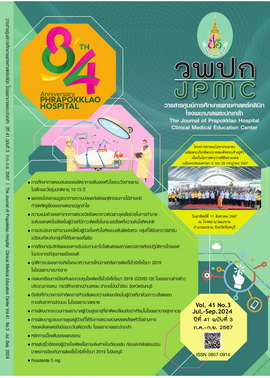An Experimental Study on the Effect of Biotin on Measurement of Thyroid Function Test in Healthy Adults
Main Article Content
Abstract
BACKGROUND: The inaccuracy of Streptavidin-based diagnostic tests in a laboratory may be associated with the ingestion of over-the-counter biotin. In the case of competitive immunoassays, which are usually used for low molecular weight targets (such as T4, T3, and cortisol), biotin interference causes an erroneously high result. In immunometric (sandwich) assays such as TSH, it gives a misleadingly low result.
OBJECTIVES: The aim of this study was to assess the effect of consuming 10 mg per day of biotin on thyroid function test interference.
METHODS: This experimental research study was done at Somdech Phranangchao Sirikit Hospital from August 2023 to January 2024. The study enrolled healthy volunteers aged 18 years or older, who were instructed to take 10 mg/d of biotin. Thyroid function tests were measured at baseline, during biotin supplementation, and 7 days after withdrawal. The primary outcome was percent change in mean FT3, FT4 and TSH. Laboratory results were compared with baseline (day 0) measures on the 7th day of biotin treatment and 7 days after stopping biotin. The proportion of patients with biotin interference (Beckman UniCel DxI 800 vs Roche Cobas Elecsys e801) was assessed as a key secondary outcome.
RESULTS: A total of 25 participants were enrolled. After biotin supplementation, there was a significant increase in FT3 and FT4 in the Beckman group (1.43 [95% CI 0.11, 2.75]; p=0.04), (0.55 [95% CI 0.16, 0.95]; p=0.008) compared with baseline, which returned to baseline 7 days after biotin washout. No difference in the Roche Hyperthyroid pattern from biotin interference occurred in 6 of 25 patients (24%) in the Beckman assays.
CONCLUSIONS: Biotin can interfere with thyroid laboratory tests. It is also necessary to stop taking biotin for at least 7 days before testing.
Thaiclinicaltrials.org number, TCTR20240411004
Article Details

This work is licensed under a Creative Commons Attribution-NonCommercial-NoDerivatives 4.0 International License.
References
Hollowell JG, Staehling NW, Flanders WD, Hannon WH, Gunter EW, Spencer CA, et al. Serum TSH, T(4), and thyroid antibodies in the United States population (1988 to 1994): National Health and Nutrition Examination Survey (NHANES III). J Clin Endocrinol Metab 2002;87:489-99.
Aoki Y, Belin RM, Clickner R, Jeffries R, Phillips L, Mahaffey KR. Serum TSH and total T4 in the United States population and their association with participant characteristics: National Health and Nutrition Examination Survey (NHANES 1999-2002). Thyroid 2007;17:1211-23.
Konrády A. T3-thyrotoxicosis: incidence, significance and correlation with iodine intake. Orv Hetil 2000;141:337-40.
Soldin OP, Goughenour BE, Gilbert SZ, Landy HJ, Soldin SJ. Thyroid hormone levels associated with active and passive cigarette smoking. Thyroid 2009;19:817-23.
Soldin OP.Thyroid function testing in pregnancy and thyroid disease: trimester-specific reference intervals. Ther Drug Monit 2006;28:8-11.
Li D, Radulescu A, Shrestha RT, Root M, Karger AB, Killeen AA, et al. Association of biotin ingestion with performance of hormone and nonhormone assays in healthy adults. JAMA 2017;318:1150-60.
McBride M, Dasgupta A. Significant interference of biotin in thyroid function tests using Beckman analyzer: how to identify such interferences?. Ann Clin Lab Sci 2023;53:130-3.
Paketçi A, Köse E, GürsoyÇalan Ö, Acar S, Teke P, Demirci F, et al. Serum level of biotin rather than the daily dosage is the main determinant of interference on thyroid function assays. Horm Res Paediatr 2019;92:92-8.
Ylli D, Soldin SJ, Stolze B, Wei B, Nigussie G, Nguyen H, et al. Biotin interference in assays for thyroid hormones, thyrotropin and thyroglobulin. Thyroid 2021;31:1160-70.
James A, Stalan J, Kuzhively J. Biotin induced biochemical hyperthyroidism: a case report and review of the literature. J Med Case Rep [Internet]. 2023 [cited 2024 May 21];17(1):266. Available from: https://www.ncbi.nlm.nih.gov/pmc/articles/PMC10304644/pdf/13256_2023_Article_4002.pdf
Alvarez-Payares JC, Bello-Simanca JD, De La Peña-Arrieta EJ, Agamez-Gomez JE, Garcia-Rueda JE, Rodriguez-Arrieta A, et al. Common pitfalls in the interpretation of endocrine tests. Front Endocrinol (Lausanne) [Internet]. 2021[cited 2024 May 21];12:727628. Available from: https://www.ncbi.nlm.nih.gov/pmc/articles/PMC8453144/pdf/fendo-12-727628.pdf
Kabiri P, Weiskirchen R, van Helden J. The biotin interference within interference suppressed immunoassays. J Clin Lab Anal [Internet]. 2021 [cited 2024 May 21];35(9):e23940.Available from: https://www.ncbi.nlm.nih.gov/pmc/articles/PMC8418509/pdf/JCLA-35-e23940.pdf
Lim SK, Pilon A, Guéchot J. Biotin interferes with free thyroid hormone and thyroglobulin, but not TSH measurements using Beckman-access immunoassays. Ann Endocrinol (Paris) 2017;78:186-7.
Roche Diagnostics. Elecsys® T4 [Internet]. 2024 [cited 2024 May 21]. Available from: https://diagnostics.roche.com/global/en/products/lab/elecsys-t4-cps-000517.html#productSpecs
McBride M, Dasgupta A. Significant interference of biotin in thyroid function tests using Beckman analyzer: how to identify such interferences?. Ann Clin Lab Sci 2023;53:130-3.

